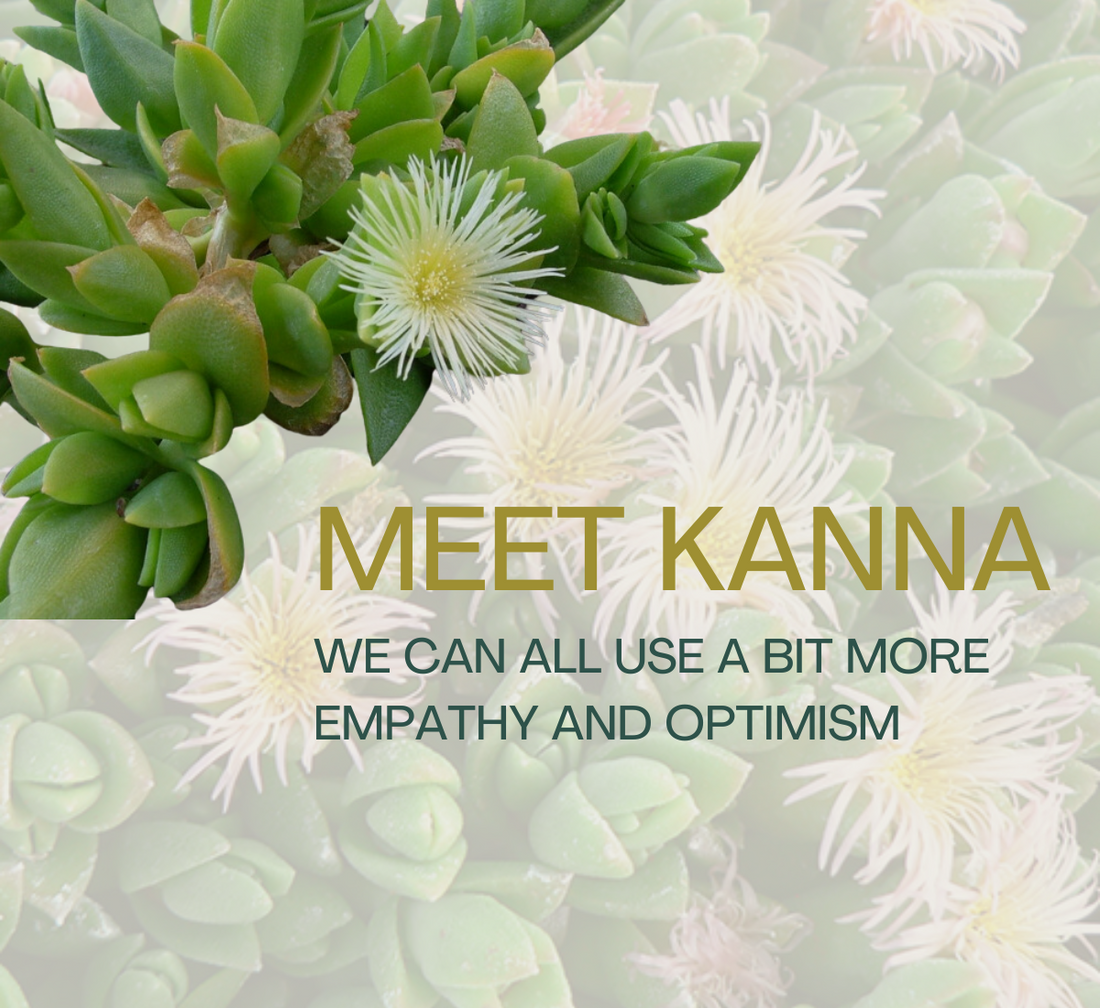Hello Curious Humans,
It is our pleasure to introduce, Kanna. possibly your new daily sidekick to lift your spirits and help you see the glass half full.
Kanna, or Sceletium Tortuosum, has applications as a daily supplement to boost your mood, as a ceremonial plant to elicit connection and heart-opening, and is even being used recreationally as a safe alternative to party drugs and alcohol, or what we like to call, an anti-vice.
Kanna is safe for daily use, making it super easy to integrate into your lifestyle.
Here are a few reasons why we love Kanna:
LOVE & CONNECTION
- A powerful empathogen and aphrodisiac
- Evokes feelings of connectedness to oneself and others
- Produces euphoric effects at higher doses
- Entheogenic connection to spirit
MOOD & COGNITION
- Induces mental clarity and acuity
- Benefits memory
- Creates feelings of joy and optimism
RELAXATION & RECOVERY
- Relieves stress and eases tension
- Supports the central nervous system
- Suppresses appetite
- Reduces pain in the body
Intriguing isn't it!
Kanna is an entheogen belonging to a family of psychoactive plants that can produce altered states of consciousness. Also categorized as an empathogen, or “heart-opener,” Kanna is known to elicit feelings of connectedness and oneness. Oh, and did we mention it's legal?
Now is a good time to talk about the difference between psychoactives vs. psychedelics.
Psychedelics are serotonergic hallucinogens, a class of substances such as LSD, psilocybin, DMT, and Ayahuasca, that can produce profound changes in perception, reality distortion including time and vision-altering experiences, and even ones sense of self.
Psychoactive substances, like Kanna, are defined as anything that crosses the blood-brain barrier, including caffeine and cannabis, that can affect mental and emotional states and consciousness, but typically do not produce hallucinogenic experiences.
Anthropologic Background
Kanna is a low-growing succulent plant native to the desert region of South Africa called the Karoo. It has traditional use among the San and Khoi tribes for its ability to enhance mood, improve stamina, and reduce pain and tension in the body.
The San and Khoi, possibly the oldest cultures on earth according to DNA tests, used Kanna as prosocial, functional, and ceremonial plant medicine. Traditionally, Kanna was used daily, and integrated into every aspect of their lives.
The San, made up of hunter-gatherer tribes, took Kanna with them on long hunting excursions to supplement their endurance, improve mental acuity, suppress hunger, and to help them feel more connected and tuned into themselves, each other, and the nature around them. The Khoi people were traditionally a nomadic herding culture who also used Kanna for its body and mind enhancing benefits, suppressing thirst, hunger, and relieving pain.
As Kanna's popularity in the West expands, it's important to recognize and respect its origins as a sacred plant medicine that possibly helped define two of the world's most ancient cultures.
Pharmacology - How Kanna works
At a high level, Kanna stimulates the release of more serotonin, dopamine and norepinephrine. It is known for having what we'll refer to as "lite" SSRI activity, functioning similarly to a synthetic SSRI but without the negative side effects.
Looking more closely, there are upwards of 25 alkaloid compounds responsible for the body and mind enhancing effects of Kanna, however, a few of them have demonstrated notable promise in treating depression, anxiety, creating feels of euphoria and bliss, and even proving effective as anti-psychotics.
The primary alkaloids are mesembrine and mesembrenone, which when consumed, act as selective serotonin reuptake inhibitors (SSRIs), phosphodiesterase 4 (PDE4), and 5-HT reuptake inhibitors. In psychopharmacology, SSRIs are commonly prescribed to treat depression and anxiety disorders, as they block the reabsorption (reuptake) of serotonin into neurons, making more serotonin available for transmission between neurons.
PDE4 inhibitors are neuroprotective, increase the flow of blood and oxygen to the brain, and have demonstrated procognitive effects. Used successfully as anti-psychotics. They have even been explored as treatments for central nervous system disorders like major depressive disorder, schizophrenia, Parkinson's disease, Alzheimers disease, and inflammatory conditions like COPD.
5-HT reuptake inhibitors are used effectively as tricyclic anti-depressants (TCAs) and monoamine oxidase inhibitors (MAO-Is).
Dosing
Doses of Kanna range from roughly 25-50mg per day to 100-200+mg per day. Researchers have found that up to 6mg per kg of body weight per day would be completely safe to consume. For the average human adult, that's 420mg per day.
Risks
The risk profile for Kanna is very low, and there is no known lethal dose. Kanna is non-habit-forming, non-addictive, and does not produce a tolerance.
That said, Kanna is a serotonin reuptake inhibitor and can have negative interactions with other substances. Please consult your doctor before taking Kanna (Sceletium Tortuosum).
Good Psyche's Take Away
Faced with a global mental health crisis, now more than ever, the world needs access to safe remedies to address mental and emotional wellbeing. We believe that Kanna is a beautiful way to integrate a safe, natural remedy for modern day problems. It can make every day just a little bit better. We like to call it, our sidekick.
References:
Third Wave Ultimate Guide to Kanna
Mayo Clinic SSRIs
NIH Chewable Cure Kanna
NIH Sceletium for Managing Anxiety, Depression, and Cognitive Impairment

